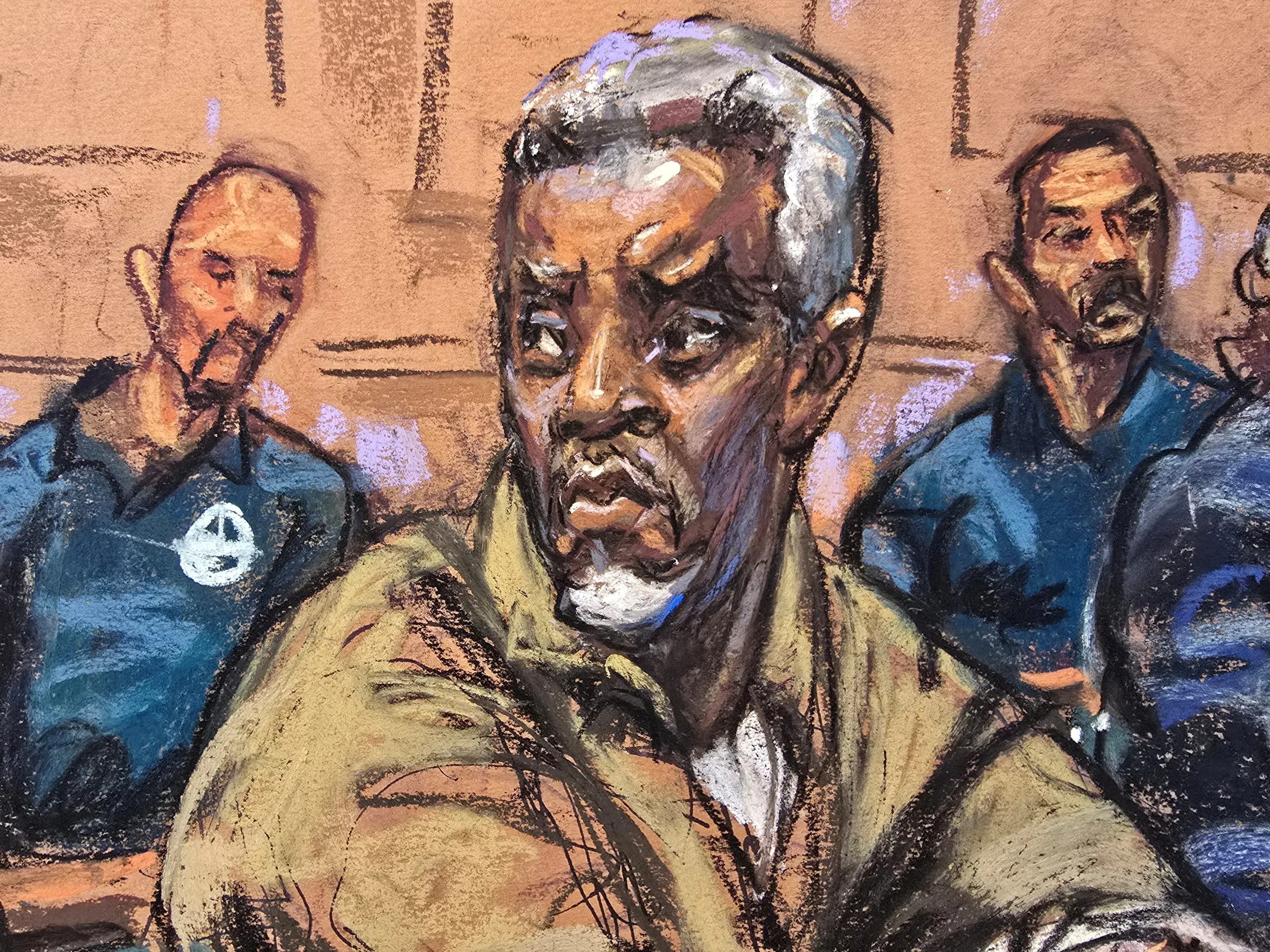Dear Permission to be Powerful Reader,
The fourth day of Sean “Diddy” Combs’s federal sex-trafficking trial dawned with a tense hush in the Manhattan courtroom. U.S. District Judge Arun Subramanian convened early, addressing last-minute disputes before the jury was brought in.
Defense and prosecution lawyers had sparred overnight in letters to the court, and the judge was adamant about setting boundaries: he denied a defense request to introduce certain extremely explicit text messages (references to specific sex acts) that he feared would create “unfair prejudice or victimization” of.
He also scolded Combs’s attorneys for dumping a trove of 400 documents on prosecutors the night before – “enormous, duplicative” exhibits, most of which would never see the light of trial.
The message was clear: the day’s cross-examination of Combs’s chief accuser, Casandra “Cassie” Ventura, would proceed under strict rules of engagement.
At 9:30 a.m. EDT sharp, Cassie re-took the stand. The 38-year-old R&B singer – visibly in her third trimester of pregnancy – smoothed her form-fitting gray turtleneck dress and draped a long dark jacket over her shoulders as she settled in.
Despite the life-altering stakes, she appeared composed, folding her hands atop the swell of her belly. Combs, 55, watched intently from the defense table, his chin resting on one hand. Dressed in a tailored suit, he cut a calm figure, betraying little of the pressure.
The jurors filed in, and a packed gallery of onlookers did the same – Combs’s mother and sons among them, along with Cassie’s husband and supporters, all bracing for what promised to be a dramatic confrontation.
With everyone seated, Judge Subramanian’s gaze swept across the courtroom. “Counsel, you may proceed,” he nodded to the defense table.
Attorney Anna Estevao rose, a thick binder of papers in hand. Cassie clasped a tissue in one hand – a small white anchor for the emotions under the surface.
The duel was about to begin.
Estevao’s strategy became evident immediately: she intended to turn Cassie’s own words against her.
In a gentle, almost friendly tone, the defense lawyer began reading aloud from years-old emails and text messages between Cassie and Combs.
These messages ranged from tender proclamations of love to shockingly explicit sexual entreaties. Estevao read Combs’s lines, and Cassie, under obligation, read her own responses, her voice clear but subdued. Jurors leaned forward as this intimate correspondence unfolded on their monitors.
“In August 2009, Mr. Combs asked you when you wanted the next encounter to be. Do you recall your reply?” Estevao inquired.
Cassie nodded faintly. On the screen, a text bubble appeared. “I’m always ready to freak off,” she read aloud, the slang term “freak-off” hanging in the air.
A ripple went through the courtroom. A few jurors exchanged glances; one woman juror pressed her lips together and shook her head as the explicit phrase appeared.
Combs’s lawyers have insisted all these notorious “freak-offs” – multi-day, drug-fueled sexual encounters involving hired male escorts – were consensual adventures in a swinger lifestyle, not crimes.
The defense now seized on Cassie’s own enthusiastic words to support that narrative. Two days after that 2009 exchange, Estevao noted, Cassie had sent Combs another salacious message.
Cassie read it softly, cheeks warm: “Me too, I just want it to be uncontrollable,” she had written to him. In the text thread, Combs responded with evident eagerness.
Estevao paced casually before the witness stand.
“Those were your words, Ms. Ventura. ‘Always ready to freak off.’
And ‘uncontrollable’ – sounds like anticipation, even enjoyment, doesn’t it?” she posed, arching an eyebrow. Her tone was polite, almost conversational. Cassie shifted in her seat, aware that dozens of eyes were fixed on her.
“Loving FOs – freak-offs – were just words at that point,” Cassie answered.
Explaining that she often told Combs what he wanted to hear.
The truth, she had testified earlier, was far darker: he coerced and blackmailed her into these orgies throughout their 11-year on-and-off relationship.
But now, under cross-exam, Cassie had to acknowledge her intimate messages without the full context of fear behind them. As more exchanges flashed on the screen – some romantic, some pornographic – Estevao’s reading and Cassie’s responses began to feel like a disturbing call-and-response.
At times the scene was bizarrely cordial; the lawyer’s voice was gentle, and Cassie even smiled thinly at a few memories of sweeter moments. The atmosphere grew so disarmingly collegial that it felt “like two friends chatting,” as one reporter would later put it.
Yet the undercurrent of menace remained. After one especially graphic text sequence, Cassie paused.
“Judge, may I…take a short break?” she asked quietly, her composure finally fraying.
In that exchange, she had described in explicit detail acts she “hated doing” but pretended to enjoy at Combs’s behest.
Judge Subramanian granted the request immediately. Cassie closed her eyes for a moment, gathering herself, as the jurors were ushered out for recess. She had survived the first onslaught.
As everyone stood for the break, the tension in the room eased into a low murmur.
Combs leaned back at the defense table, unfolding his long frame. Strikingly, he appeared relaxed – even nonchalant. He crossed his legs, hands interlaced over his stomach, as if enjoying a brief intermission.
In contrast, many in the gallery exhaled shakily. The courtroom was packed to the walls: family, friends, reporters, all absorbing the shock of Cassie’s private intimacies being laid bare. In the front row, Cassie’s husband fixed his gaze on her, concern etched on his face, while Combs’s mother glanced down, expression unreadable.
Notably absent were Combs’s young twin daughters; they had been kept away from court that day, spared from hearing their father’s salacious text messages read aloud.
Jurors stretched and whispered among themselves. Several had been intently following along with the on-screen messages. One man in the jury box sat rubbing his chin, eyes narrowed in thought.
A female juror who had earlier shaken her head now scribbled a note on her pad. Even for a panel prepared to hear ugly things, the morning’s testimony was extraordinary.
“This story may contain accounts and descriptions of actual or alleged events that some readers may find disturbing,” an ABC News bulletin had warned
And indeed, the courtroom itself seemed caught between fascination and revulsion.
At the defense table, Diddy conferred with his lawyers in hushed tones. One attorney shuffled a thick stack of Post-it notes, which Combs took in hand, jotting down a few thoughts.
Then, in a moment of almost cinematic surreality, the hip-hop mogul swiveled to face a cluster of press seated behind him. Flashing the charismatic grin familiar from music videos and red carpets, he nodded.
“How you doing?” he said casually, addressing the wide-eyed journalists.
A ripple of uneasy laughter broke out – an audacious bit of showmanship in the middle of a trial for sex trafficking. Combs’s ability to command a room, even now, was undeniable.
But the spell was quickly broken by the sight of the witness stand, where Cassie was returning, dabbing the corner of her eye with a tissue. The recess was over; the performance was about to resume.
Judge Subramanian called the court back to order. Cassie straightened in her chair. She had already shed tears on the stand over the past two days of prosecution questioning – breaking down as she recounted the most grotesque and humiliating moments of her life with Combs.
Today, however, she steeled herself, determined to remain matter-of-fact despite the deeply personal nature of the cross-examination. The jurors settled in. A collective breath was held.
Violence and Shame Revisited
Estevao’s next line of inquiry shifted away from text messages to the broader relationship, probing at Cassie’s credibility and the darker allegations she’s made. If Day Three of the trial had been all about Cassie’s pain, Day Four was about questioning it.
The defense sought to reframe Cassie and Combs’s 11-year saga as a “mutually toxic” romance – passionate, troubled, but not a criminal enterprise. Thus, even as she touched on the violence Cassie endured, Estevao aimed to cast doubt or draw equivalence.
“Ms. Ventura,” the lawyer began, resuming her post at a podium, “you testified yesterday about a lot of violence. You would agree the relationship was…complicated?”
Cassie inhaled slowly. She knew where this was headed. Indeed, just before cross began, Combs’s lead counsel Marc Agnifilo had previewed to the judge that infidelity and mutual aggression would be pillars of their defense.
Now Estevao homed in on those themes. She asked if Cassie had ever been jealous of Combs’s other relationships – for instance, his long-time ex, the late model Kim Porter. Cassie admitted that yes, she had felt pangs of jealousy toward Porter at times.
The defense attorney nodded, pressing: hadn’t Cassie herself been unfaithful on occasion?
Cassie stiffened, knowing this referred to her brief dalliance with actor Kid Cudi in 2011. Under oath the day before, she had already recounted how Combs’s fury over that episode led to frightening threats – he even allegedly claimed he would blow up Cudi’s car in retaliation.
(“Cudi’s car exploded in his driveway a short time later,” her lawsuit noted pointedly.)
Cassie explained to the jury that she ended things with Cudi precisely because she feared Combs’s wrath:
“Too much danger, too much uncertainty,” she had told the court.
Estevao pivoted to the notorious “freak-offs” themselves. She posited that what Combs did was essentially part of a “swingers lifestyle”, nothing more.
“Mr. Combs sometimes watched you with other men, and you watched him with other women – isn’t that consensual swinging?” she suggested.
Cassie frowned.
“In a sexual way, you could call it that,” she conceded carefully. Then she firmly added, “They’re very different”.
The public “swingers” parties Combs hosted for celebrities were a far cry from the private horrors of the freak-offs, she explained. Those hotel-room orgies were closed off and controlled, often in darkness, with Combs dictating every detail – even the lighting and the color of Cassie’s nail polish.
This wasn’t free-spirited swapping; it was, as Cassie had described, Combs’s obsession with voyeuristic control. Her subtle pushback landed powerfully.
The defense then touched on Cassie’s history of drug use, implying she was a willing partner in the relationship’s excesses. Estevao noted that Combs had encouraged Cassie to get help for her addiction at one point – even telling Los Angeles drug dealers to stop supplying her and suggesting she seek treatment.
Cassie agreed that happened once. But she clarified the context: Combs only wanted to monopolize her drug use.
“He only wanted me to do drugs with him, not with friends,” she testified.
Making it clear this was about control, not genuine care.
In fact, both of them had spiraled into opioid dependence during their time together. Cassie had started taking painkillers with Combs in her teens and grew heavily dependent, numbing herself to endure the indignities of the freak-offs.
By the end of the relationship, she said…
“I was always so numb because that’s what I chose to get through it”, relying on drugs to dissociate from trauma.
Estevao let that sit for a moment, the jurors digesting that both lover and beloved were mired in self-destruction.
Under gentle but pointed questioning, Cassie also acknowledged that she had not been a perfect victim. Early on, she sometimes fought back physically against Combs’s abuse – even, on one occasion, throwing the first punch.
“Yes,” Cassie admitted, she once initiated a fight in a Cadillac Escalade, striking Combs in the face in a burst of anger.
Her retaliation only unleashed a greater fury. As she had recounted, Combs’s “whole demeanor changed. His eyes went black,” and he had pummeled and stomped on her under the SUV’s backseat in a merciless rage.
Bruised and battered from that car ride, Cassie was so disfigured that one of Combs’s own bodyguards wept upon seeing her:
“When D-Roc saw me he started to cry,” she had testified, recalling her “black eyes, golf ball-sized knot on my forehead, busted lip”.
Now, in cross, Estevao did not invite those vivid details – but neither could she erase them from the jurors’ minds. Cassie’s prior testimony had painted a harrowing picture of life with Combs: beatings, coercion, and constant fear. Any suggestion that she had wanted such a life seemed to hang absurdly in the air.
Indeed, just the day before, Cassie had described to the court how Combs trapped her in a cycle of abuse and blackmail.
He would secretly record her sexual encounters during freak-offs, then threaten to release the videos if she disobeyed him.
“It’s horrible and disgusting. No one should do that to anyone,” she had testified, voice breaking.
One chilling example: on a private jet from Cannes, Combs had openly played videos of her with other men on loop, taunting and terrorizing her mid-flight.
“I didn’t want to feel scared anymore,” Cassie said of that moment.
“He could put these videos out and ruin everything and embarrass me.”
After landing, she swallowed her dread and accompanied him straight to another freak-off, feeling she had no choice.
This was the real story Cassie was determined to convey – a story of survival, not salacious adventure. Now, as the cross-examination wound on, Cassie maintained a calm demeanor, but the shame and hurt she had endured were evident between the lines of every answer.
The Defense’s Counter-Narrative
By afternoon, Estevao’s cross-examination had covered substantial ground. The defense had highlighted Cassie and Combs’s tender moments and her complicity in the relationship’s excesses.
They suggested that behind closed doors, she was a willing participant who only later reframed these experiences as “trauma.” Combs’s team posited that while the couple’s lifestyle may have been extreme – “excesses” of the rich and famous – none of it amounted to a federal crime.
In opening statements earlier that week, Combs’s attorney had bluntly conceded that the music mogul could be volatile and had “violent outbursts,” but insisted “all of the sex was consensual” and that Combs was simply part of a non-criminal swinger scene.
Now Estevao drove that narrative home: Yes, Combs had a dark side, even hit Cassie sometimes, but he never trafficked her. Nothing he did, the defense argued, was akin to running a criminal enterprise – it was “just” a toxic love story gone wrong.
To reinforce their point, Combs’s lawyers reminded the jury that Cassie stayed with him for years despite opportunities to leave. They alluded to the fact that she even had consensual sex with Combs one final time after an alleged rape in 2018 – a detail Cassie herself had painfully acknowledged:
“We’d been together 10 years; you just don’t turn feelings off that way,” she had explained of that post-assault encounter.
The defense wanted the jury to see Cassie not as a helpless victim but as a complex, perhaps unreliable narrator of her own story – a woman who wrote love notes and shared drugs with Combs, who hit him back in fits of anger, and who only came forward years later after securing a hefty financial settlement.
Indeed, Estevao made subtle mention of Cassie’s $20 million settlement with Combs. Cassie had revealed on direct examination that she sued Combs in November 2023 for years of abuse, and he agreed to pay $20 million within just 24 hours of the filing.
The defense implied this payout gave Cassie a powerful financial motive to exaggerate or even fabricate the most egregious claims.
Why, jurors might wonder, would Combs pay so much so quickly if not to silence an inconvenient falsehood?
Conversely, why would Cassie settle so fast if her goal was justice? The unspoken questions hung in the air.
But Cassie did not waver. She had already told the court why she couldn’t stay silent. After leaving Combs, she spiraled into depression, haunted by “horrible flashbacks” of the abuse.
By 2023 she was in rehab for trauma, at times suicidal. In a quavering voice, she described one low point when
“I was spinning out and I didn’t want to be alive anymore… I tried to walk out the front door into traffic,” only to be saved by her husband grabbing her at the last moment.
Jurors watched as Cassie held a tissue to her eyes recalling that despair Writing a memoir became her therapy –
“putting everything on paper so I could really understand what I had been through”, she said.
She even offered Combs the chance to read her draft, asking for an astronomical $30 million for the rights – a number she chose simply to get his attention, not expecting him to pay. (He never did.)
Finally, she filed the lawsuit that would blow the lid off Combs’s secret life. And once she did, dozens of other women and even some men came forward with similar claims of sexual abuse at the hands of Combs.
A law enforcement investigation was launched, leading to the criminal charges now at trial.
Far from seeking just a payday, Cassie’s actions had exposed something much larger – an alleged pattern of predation by one of the music industry’s most powerful figures.
As Estevao’s cross-examination drew toward a close (to be continued the next day), she asked Cassie one final question with a hint of skepticism:
“After everything, why are you testifying here now, Ms. Ventura?”
Cassie looked over briefly at Combs, then back to the jurors. Her face was resolute.
“I can’t carry this anymore,” she said, her voice steady. “I can’t carry the shame, the guilt, the way he treated people like they were disposable. What’s right is right, what’s wrong is wrong. I came here to do the right thing.”
In the quiet that followed, even Sean Combs dropped his gaze. The judge nodded and recessed the court for the day. Cassie exhaled, tears welling as she stepped down from the stand, one hand instinctively resting on her unborn child.
In that moment, the courtroom felt less like a stage for salacious revelations and more like a crucible of truth and accountability. The battle of narratives was far from over – the defense would continue its counterattack on Friday, and other witnesses (including an alleged victim known only as “Mia”) waited in the wings to testify.
But for this single day in May, the spotlight belonged to Cassie Ventura: a woman laying bare her darkest secrets in a quest for justice. Her words – of love, of terror, of resilience – hung in the air as the spectators filed out. It was a real-life courtroom drama more vivid and lurid than any fiction, and its final chapters had yet to be written.
Until next time,














